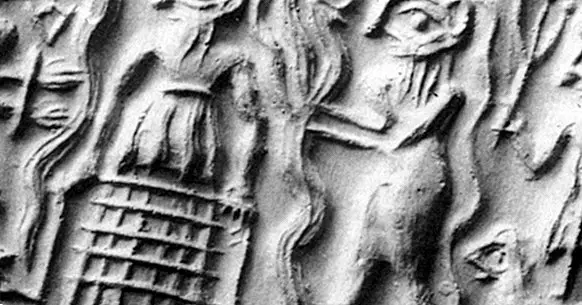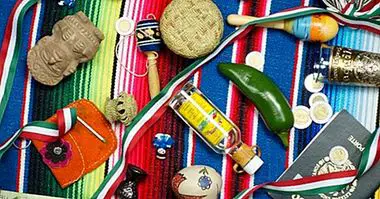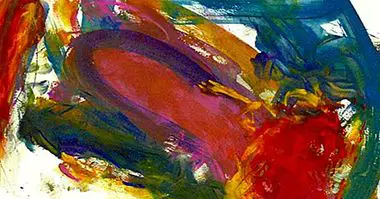The 7 most important Sumerian gods
There is very little information about the Sumerian religion. The Sumerians are in fact the oldest civilization of mankind. As it used to happen in many of the millenarian religions, the Sumerians had different deities that represented one or another conception.
In this article we will see the most important Sumerian gods and of which more information is available, hence its importance.
- Related article: "Types of religion (and their differences of beliefs and ideas)"
The 7 most important Sumerian gods
As the name suggests, the Sumerians were inhabitants of the Sumer region, located in the current Middle East and that occupied what today are Syria, Iraq and Jordan, approximately between the Euphrates and Tigris rivers.
Some of the most complete studies that have been conducted around this civilization, carried out by National Geographic or Discovery World, suggest that we are very likely to be the oldest civilization of all time . The problem is that there is no clear starting point to define its origin.
Likewise, the Sumerians were so archaic and primitive that they basically dedicated their lives solely and exclusively to subsistence activities and to worship and please their deities. However, we owe them the invention of the wheel back in 3000 BC. Next we will see the most important Sumerian gods.
1. Inanna
The goddess Inanna is one of the most flattered representations by the Sumerians, and even was adopted later by the Assyrians (with the name of Ishtar). This figure of female body, wings and feet of an eagle, represented sexuality, fertility, love and, curiously, war.
2. Enlil
Another of the Sumerian gods of great importance to be the master and lord of meteorology : represented the storms, wind and air and therefore was the deity of creation. The mythology explains that Enlil separated his father and mother to form heaven and earth, which is why the Sumerians believed him to be the creation.
3. An
An is known as the god of the heavens, being the most relevant deity of the Sumerian pantheon. However, this role ended up sharing with the god Enlil, because Sumerian mythology was variable and has always been modified over time. Similarly, he continued to hold a privileged place in the pantheon.
- Maybe you're interested: "25 Egyptian gods (biography, personality and legacy)"
4. Utu
Twin brother of Inanna, he was the god of the sun and justice. Both concepts had a supreme importance in the Sumerian civilization, since at the time of organizing politically the city-state, the subjects appealed to Utu to legislate . In addition, being also the sun god, he also occupied a privileged position in the Sumerian pantheon.
5. Ninhursag
Another of the most relevant female deities of the Sumerian gods. She was known as "the mother of all goddesses", protective of women and children . As a curiosity, she was also the goddess of life and earth, which gives her a semi-creative status together with Utu.
6. Nanna
Nanna, or Nannar in the Mesopotamian culture, is known as the god of the moon. Son of Enlil and Ninlil (gods of the sky and air respectively). In this way, Nanna represented astrology and wisdom and was also the protector of the flock and the shepherds of the earth. A temple was built in honor of this deity: Zigurat de Ur, today ruins in what we know today as the country of Iraq.
7. Nammu
As a curiosity, we must emphasize the large number of female deities that the Sumerians worshiped, and they had almost equal numbers worshiping each other. Nammu is also considered one of the most important Sumerian goddesses , because with it everything began: "the abyss of the waters". Water represents life, the beginning of everything. She was the goddess of birth and life.
Sumer as the origin of all civilization
As we have seen in the introduction, we owe so much to the Sumerians, that it is advisable to delve a bit into their history and their contributions to humanity, especially in politics and urban development. To the Sumerians they are credited with creating the first nation-cities , an administrative organization that continues to be reflected in our days, and the unquestionable development of agriculture.
There is very good literature to deal with historical and scientific rigor on the Sumerians and their gods, as well as their customs and habits. One of them is the American author of Ukrainian origin, Samuel Noah Kramer and his great work The story begins in Sumer published in the year 1956 that, to this day, is still considered the best research book about the Sumerians and their legacy.
Bibliographic references:
- Black, J. A .; Cunningham, Graham; Robson, Eleanor (2006), The Literature of Ancient Sumer. Oxford: Oxford University Press.
- Coleman, J. A .; Davidson, George (2015), The Dictionary of Mythology: An A-Z of Themes, Legends, and Heroes. London: Arcturus Publishing Limited.



















